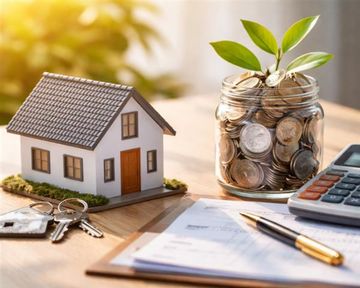Myths about asking price when selling your home
Real estate transactions, particularly for first-timers, can seem complex at times. We shed some light on the topic of asking price and debunk some of the widely accepted myths surrounding the sale of homes in the property market.
Myth 1: Sellers set their own asking price
It is a common misconception that sellers set the asking price when in reality other factors like a property's location, size, condition and the market also come into play when the asking price is being determined. A knowledgeable property professional will also be able to determine how in demand your property will be in the current market - if buyers perceive the home to be priced at fair market value, they will be much more inclined to buy than if it is not.
Myth 2: Using property portals to determine your asking price
While using property portals to get a general idea of the market, setting your asking price solely based on what you are seeing on a property portal is not advised. There are too many factors and variables that goes into pricing a property that you will only harm your selling chances by doing this.
It is therefore not only advisable to rather work with a local property professional that not only knows your market well but can also use a comparative market analysis (CMA) to help you determine your property's asking price accurately.
Myth 3: Overpricing allows room for negotiation
This is probably one of the most longstanding myths when it comes to selling your property, the fact of the matter is that overpricing your property will drive away potential buyers.
Your inflated price will alienate all kinds of buyers. Those able to afford your inflated asking price will eventually recognise that your home offers less than other homes in the same price bracket, and those that would be able to afford it at the correct asking price won't even try to buy it - why invest time and energy into a property they think they can't afford?
Correct pricing from the start ensures optimal market engagement and a fair selling price.
What to do if your home is overpriced
Before working out what to do when your property overpriced you need to determine if your home is truly overpriced. Here is how to tell if your property is overpriced:
- The home is priced well above neighbouring properties for sale
- Buyer interest is very low - even on show days
- Despite months of marketing, all the offers are below the asking price
- Properties in the neighbourhood are selling quickly, while yours aren't
Now that you have answered these questions you need to work on a plan of action.
- Plan a fresh start - We recommend taking down your old listing, sprucing up your property if possible, and taking fresh photos of the property - this is especially helpful if the property was first listed in winter when the garden wasn't looking its best. Not only will this reduce the chances of house hunters immediately recognizing the property and jumping to negative conclusions about its desirability, but it will also put your home's best foot forward in a competitive market.
- Don't make the same mistake twice - We suggest getting a revised set of valuations done before re-listing, preferably by two or three agents who are active in your area. Make sure your agent can back up their valuations with good, hard evidence like a comparative market report that showcases facts and trends for property in your area
- Be transparent with buyers - If you do attract buyers who previously avoided your property because of its overvalued price tag, be honest and upfront with them. They might have some doubts about potential flaws or defects that could have caused the price reduction. Your job is to ease the doubts by having copies of approved plans, comprehensive defect lists and even getting a professional home inspection report done if possible. Nothing is more comforting to a buyer than a seller that is 100% above board. Defect lists are best drawn up with the help of your agent, who can assist you in being unambiguous without overplaying ordinary flaws. Professional home inspection reports can be commissioned at any number of inspection agencies, but make sure your chosen inspector is fully accredited.
Myth 4: Renovations guarantee increased home value
While some renovations will increase your properties resale value, not all will. If two identical homes enter the market, but one has a updated kitchen and bathrooms the one with the more modern finishes will sell quicker and for a higher asking price than the one without.
Understanding what types of renovations and upgrades will help your home sell quicker and at a better price is vital and talking to a property professional that understands the local market and what buyers are looking for in your area will help you work better when planning projects.

